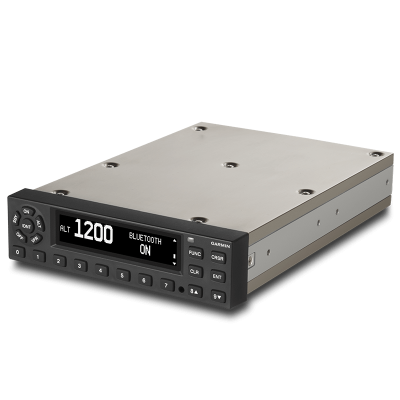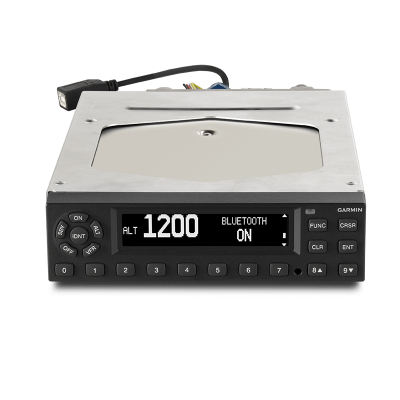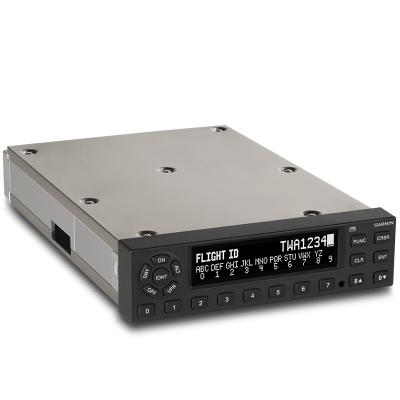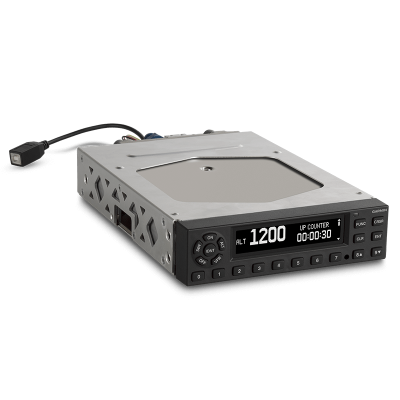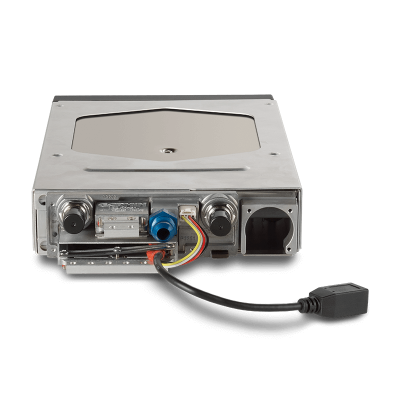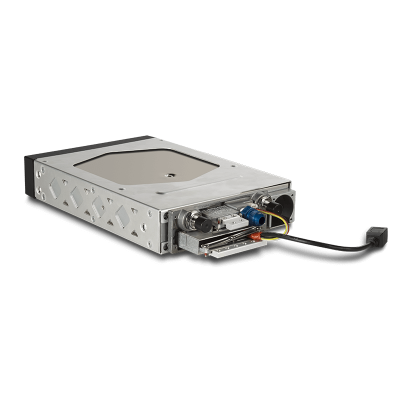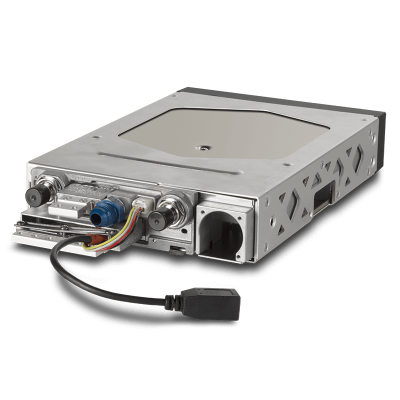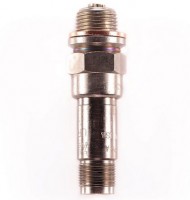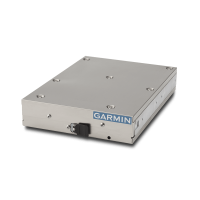Aircraft Spruce Canada
Brantford, ON Canada
Corona, CA | Peachtree City, GA
Chicago, IL | Wasilla, AK
Garmin GTX 345 Transponder Mode Small With Custom Harness
MFR Model# ASA-00211-CU
Overview
|
Note: The GTX 335/345 can only be sold to experimental aircraft. Certified aircraft must purchase this unit from a shop certified by Garmin to perform installations. All-in-one Transponder Solution for ADS-B "Out" and "In"
With the introduction of the GTX 345 series of Mode S Extended Squitter (ES) transponders, Garmin provides a one-box, one-swap solution that enables owners and operators to meet ADS-B requirements with minimal expense, downtime and disruption to their panels – while providing all the weather and traffic benefits of ADS-B In. Your Transition to NextGen Made Simple The IFR-certified GTX 345 looks and operates like a standard Mode S transponder. It fits in the same 1.65-inch high slot in your avionics stack. It boasts a bright, sunlight-readable digital display, a pressure altitude readout, handy timers for approaches and other operations, plus dedicated pushbuttons numbered 0-9 for quick and easy squawk code entry. But where other transponders leave off, the GTX 345 is just getting started. The addition of 1090 MHz ADS-B Out transmission capability (using precise GPS-referenced positioning information) enables the transponder to automatically output the more accurate, more dynamic traffic surveillance data that the NextGen airspace system requires. Plus, available ADS-B In reception unlocks even more capabilities for pilots, enabling them to display ADS-B traffic, weather and more on a variety of installed or portable displays. Your WAAS, Your Way The extra-precise GPS position reference needed to meet the traffic monitoring requirements of ADS-B can be provided either by the WAAS/SBAS-compliant navigation system that you may already have in your panel – or by an optional built-in GPS position source available with your GTX 345 transponder. However your aircraft is currently equipped, the Garmin GTX 345 series offers a simple, minimally intrusive ADS-B solution to meet your needs. For even more flexibility, optional remote mount GTX versions are available for compatibility with the GTN™ 750/650 series of GPS/Comm/Nav systems, as well as select Garmin G1000® integrated flight deck systems – all of which provide built-in remote transponder code selection and control. Benefits of ADS-B In In addition to 1090 MHz ADS-B Out, the GTX 345 also makes available the subscription-free weather and traffic display capabilities enabled by ADS-B In – which can be interfaced with compatible cockpit displays or streamed wirelessly via Garmin Connext™ to aera 796/795 or 660 series portables, as well as to popular tablets/mobile devices by way of apps such as Garmin Pilot™, or ForeFlight Mobile. The ADS-B weather link is continuously broadcast on the 978 MHz Universal Access Transceiver (UAT) frequency, and is similar to the basic services offered by leading commercial satellite weather providers. For example, you can access NEXRAD imagery, METARs, TAFs, winds and temperatures aloft, PIREPs, NOTAMs, and more1: Along with this, you can also receive ADS-B traffic position reports (and threat-level symbology) to help you see-and-avoid converging targets in busy airspace. Spoken audio alerts call out potential flight path conflicts. Dual-link Completes the Picture The GTX 345 ADS-B receiver is a dual-link system. So, it can receive on both frequencies (978 MHz and 1090 MHz) authorized for ADS-B operations in the U.S. Not only does this provide the most complete traffic picture from aircraft transmitting on either frequency, but it also enhances your aircraftfs ability to access ADS-B transmissions and services from virtually anywhere. When integrating an active traffic system with the GTX 345, ADS-B traffic and active traffic targets are merged on the display to give pilots a truly comprehensive traffic picture. ADS-B for Your Integrated Flight Deck With a variety of compatibilities covering most fielded displays, ADS-B enabled GTX series transponders offer the easiest NextGen upgrade path available from Garmin – especially for owners of select G1000-equipped aircraft. For these systems, a remote mount version, the GTX 345R, interfaces with either the aircraftfs existing WAAS position source for navigation or uses an optional built-in WAAS position source to meet ADS-B Out requirements. The G1000 series displays interface with the remote GTX transponder to provide onscreen squawk code entry and control in the conventional manner. Depending on the software version installed, your Garmin glass displays can also support subscription-free weather on the MFD – as well as ADS-B traffic targets on both the MFD and PFD displays for aircraft equipped with Synthetic Vision Technology (SVT™). Alerting and Altitude Encoding Made Simple For added situational awareness, the GTX 345 incorporates a built-in audio output for audible traffic and altitude alerts1, which can be integrated into your existing audio panel. You can also pair the GTX series with an optional Garmin altitude encoder to satisfy data transmission requirements for IFR. As opposed to other transponders with altitude encoding built in, the Garmin altitude encoder mounts separately on the install rack. So, should the transponder ever require removal, therefs no need for the static line to be disconnected. Which, in turn, eliminates the need for a follow-on leak check – and thus helps minimize ongoing service costs. An easier path to NextGen The Garmin GTX 345 series is being FAA approved for installation on hundreds of todayfs most popular aircraft makes and models. For decades, Garmin has led in the development and deployment of ADS-B technology. And when you compare all the options available, itfs clear that Garmin is committed to making your transition to ADS-B operations as simple, economical and worry-free as possible. |
Documents
Videos
Reviews
I bought the GTX 345 w/internal GPS / Area 600 bundle for my RV6. I reused my Ameri-King altitude encoder. The tool for crimping the pins onto the encoder wires cost more than the new Garmin encoder. I was also surprised at the cost of the crimpers to make up the BNC antenna connection. I am very happy with the combination, and passed my rebate flight test the first time out. The only reason I am giving this product 4 stars instead of 5 is because the Garmin manual is so weak. It does a horrible job explain the proper configuration of the system. There is at least one on-line tutorial, but it was only slightly helpful because it was for a different configuration than what I was trying to set up. Hopefully as more of these units are sold there will be better information available. I also found the process of updating the Area 660 nav data to be very cumbersome. One point of caution if you are using Foreflight - the ADS-b Airport weather displayed on the Area 660 is color coded differently. On the Garmin screens Green is marginal VFR and Red is Marginal IFR. I chose this package because it seemed like the cheapest and easiest way to get ADS-B in and out in one package, and I still fee that is true. I would go this route again given the other available offerings.
Very nice
Q&A
Please note, Aircraft Spruce Canada's personnel are not certified aircraft mechanics and can only provide general support and ideas, which should not be relied upon or implemented in lieu of consulting an A&P or other qualified technician. Aircraft Spruce Canada assumes no responsibility or liability for any issue or problem which may arise from any repair, modification or other work done from this knowledge base. Any product eligibility information provided here is based on general application guides and we recommend always referring to your specific aircraft parts manual, the parts manufacturer or consulting with a qualified mechanic.
Yes, however you will not transmit ADS-B out. Please see part number 11-14177 for ADS-B compliance.
Yes, the GTX 345 transponder will interface with the GNS-530W to display ADS-B In information including TIS-B traffic.
Yes, the GDL 88 is still available but can be replaced by the GTX 345. The GTX 345 offers the same features as the GDL 88.
The height and width of the transponders is the same so technically it will fit the same hole in the panel, however it will still require a new rack and connectors to be installed.
Yes, the GTX 345 will interface with the Garmin 430W. The GTX 345 can also send the signal to an iPad running Foreflight with Connext link.
The Flightstream 210 can be used in conjunction with the GTX 345 to transfer flight plan information. This connection is done direct from the Garmin GPS and does not tie into the transponder.
No, weather is not available on the 496 other than XM. Traffic will be limited to 8 targets when connected via the power data cable part number 11-02694. The GTX 345 has RS-232 outputs which can be wired to the power/data cable.
No, as of 3/29/16 it is not compatible with the 696. Garmin is currently working on an interface solution.
The non-GPS version is only used if you already have a WAAS GPS installed. The GDL 39 3D and GTX 345 do not interface. The Bluetooth feature is for providing weather and traffic to a display unit only (ie iPad).
No, a Flightstream 210 will still be required.

 Aircraft Spruce Canada
Aircraft Spruce Canada
